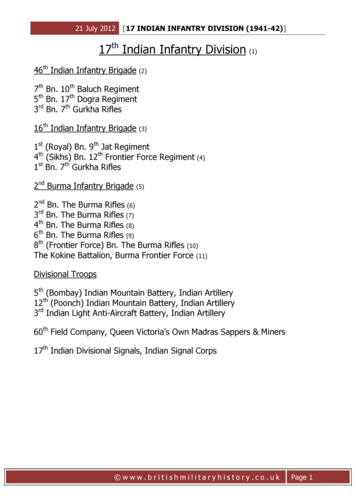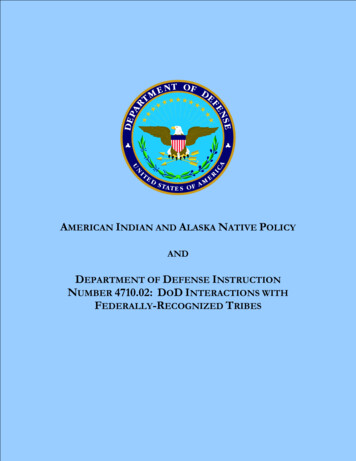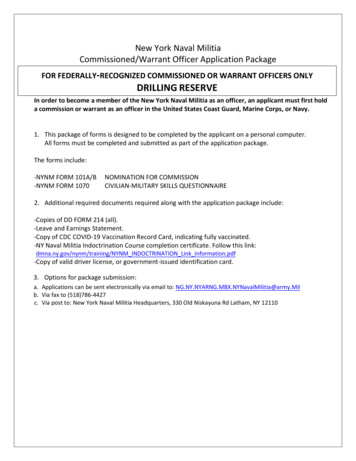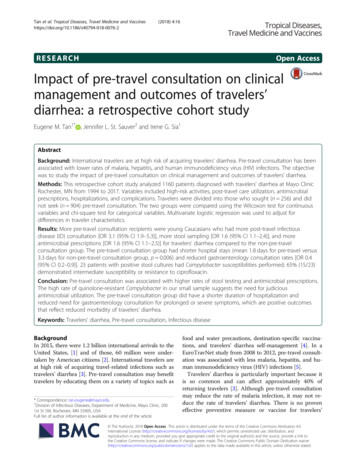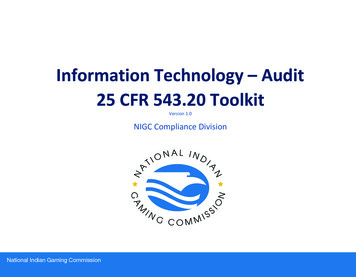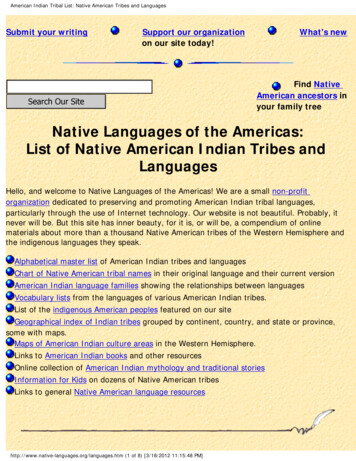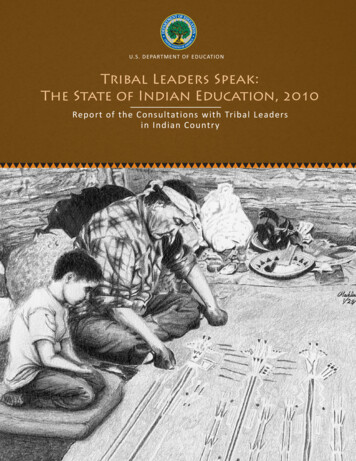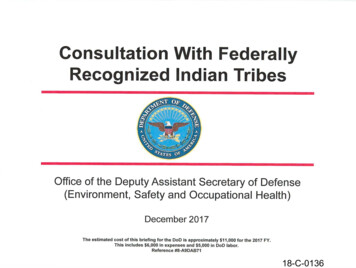
Transcription
Consultation With FederallyRecognized Indian TribesOffice of the Deputy Assistant Secretary of Defense(Environment, Safety and Occupational Health)December 2017The estimated cost of this briefing for the DoD is approximately 11,000 for the 2017 FY.This includes 6,000 in expenses and 5,000 in DoD labor.Reference #8-A9DAB7118-C-0136
PurposeRespond to House Report 114-537, p. 373, to accompany H.R. 4909,the National Defense Authorization Act of Fiscal Year 2017:". In consultation with the Secretaries of the Military Departments,provide a briefing . that addresses compliance with applicable laws,regulations., and instructions regarding interactions with Federallyrecognized Tribes. In addition, the briefing shall identify what actionscould be taken, consistent with DoDI 4710.02, to ensure that timelynotice and appropriate consultation with tribes occurs prior to taking anyactions that may have the potential to significantly affect protected tribalresources, treaty rights, or Indian lands protected by a statute,regulation or executive order."2October 201718-C-0136
Objectives Clarify how DoD ensures compliance with laws, regulations, andexecutive orders regarding requirements for timely and meaningfultribal consultation Review DoD principles regarding tribal consultation Outline the DoD-wide approach to consultation with tribes and toolsthat support the effort Describe DoD-wide efforts to assess consultation efforts across theDepartment and make improvements3October 201718-C-0136
Origins of DoDConsultation Obligations Trust ResponsibilityFiduciary DutyTreaty Reserved RightsFederal Lawso National Historic Preservation Act (NHPA)o Archeological Resources Protection Act (ARPA)o Native American Graves Protection and Repatriation Act(NAGPRA)o American Indian Religious Freedom Act (AIRFA)o Religious Freedom Restoration Action (RFRA)o National Environmental Policy Act (NEPA)o Endangered Species Act (ESA)4October 201718-C-0136
Origins of DoDConsultation Obligations Executive Orderso 13007 - Indian Sacred Sites (1996)o 13175 -Consultation and Coordination With Indian TribalGovernments (2000)5October 201718-C-0136
Origins of DoDConsultation ObligationsTrust Responsibility Tribes are separate and distinct communities with sovereignty overlands retained Treaties with tribes were intended to ensure availability of asustainable, land-based, traditional existence Treaty law -- tribes retain everything they did not expressly give up Federal Government has a duty to protect tribes' fiduciary interests inconsideration for land concessions made6October 201718-C-0136
Origins of DoDConsultation ObligationsTrust Responsibility (cont'd.) Tribes' interests includeo tribal lands (46.2m acres of reservations; 8.9m acres of allottedlands)o resources (including off-reservation reserved rights to fish, hunt,and gather on ceded lands)o human remains and other NAGPRA cultural itemso traditional cultural propertieso archeological resources7October 201718-C-0136
Origins of DoDConsultation ObligationsFiduciary Duty All Federal agencies have a role in protecting Indian resources DoD and other agencies must:- Consult with tribes prior to taking action that may affect triballands or resources- Analyze all relevant information prior to making a decision on aproposed action- Make decisions based on a tribe's best interests, among otherfactors- Maintain and provide to the tribe an accurate accounting of alltransactions affecting tribal lands or resources8October 201718-C-0136
Origins of DoDConsultation ObligationsTreaty Reserved Rights DoD must consider treaty reserved rights to resources in reviewing aproposed project Treaties are the supreme law of the land Treaty rights held by a tribe are not generally diminished by thepassage of time or non-use9October 201718-C-0136
Origins of DoDConsultation ObligationsTreaty Reserved Rights (cont'd.) Express rights outlined in treaties (principally in the Pacific Northwestand around the Great Lakes) include hunting, fishing, gathering, andgrazing rightso Tribes have right of access to "usual and accustomed" fishinglocationso Tribes have the right to take up to half of the harvestable fish,o Treaties bar actions that despoil fish habitat (see 9th Circuit's"culverts" decision) Implied rights in treaties include right to water as necessary to makeexpressly reserved rights meaningful10October 201718-C-0136
Federal Laws That IncludeRequirements for ConsultationNational Historic Preservation Act Requirement - consider impacts to National Register of HistoricPlaces-eligible properties when planning and undertaking federalactions, permits, and licenses DoD consults with tribes that attach religious or cultural significanceto identified historic properties DoD takes into account the effect of its undertaking on identifiedhistoric and culturally-significant properties11October 201718-C-0136
Federal Laws That IncludeRequirements for ConsultationArcheological Resources Protection Act Requirement - permits and/or permission to excavate "archeologicalresource" (material remains of human activity at least 100 years old) frompublic or Indian lands DoD consults with any tribe to obtain permission if archaeological resourceis on Indian lands, and notifies the tribe if archaeological resource is oninstallation land Disposition of cultural items subject to the Native American GravesProtection and Repatriation Act is conducted in accordance with theprovisions of NAGPRA12October 201718-C-0136
Federal Laws That IncludeRequirements for ConsultationNative American Graves Protection and Repatriation Act Requirement - the federal agency must consult with a tribe when anintentional excavation or inadvertent discovery of human remains onfederal or tribal lands occurs. Also includes items such as funeraryobjects, sacred objects, and objects of cultural patrimony- Items are removed in accordance with the requirements outlinedin ARPA DoD must stop work, protect the site from intrusion, and consult withthe related tribe to develop a plan of action regarding disposition ofthe remains and other items13October 201718-C-0136
Federal Laws That IncludeRequirements for ConsultationReligious Freedom Restoration Act Prohibits government from substantially burdening a person'sexercise of religion unless it can show:- That the burden furthers a compelling governmental interest; and- Is the least restrictive means of furthering that interest Consultation provides an important means to implement a proposedaction.14October 201718-C-0136
Federal Laws That IncludeRequirements for ConsultationNational Environmental Policy Act Requirement - consider environmental impacts of a proposed actthat may affect the quality of the human environment DoD is obligated to engage in a transparent decision-making processthat considers the environmental effects of a proposed project;including review of written analyses and comments from interestedparties such as tribes15October 201718-C-0136
Federal Laws That IncludeRequirements for ConsultationNational Environmental Policy Act (cont'd.) Tribes are invited to:- review scoping of the proposed project;- discuss conflicts with tribal land use plans and policies;- provide comments on a draft Environmental Impact Statementwhen there are effects to Indian lands; and- participate in hearings, review documents related to the project.16October 201718-C-0136
Federal Laws That IncludeRequirements for ConsultationEndangered Species Act Requirement - when an action proposed by a federal agency mayaffect tribal trust resources (fishing, hunting, gathering, etc.),consultation is required DoD invites affected tribes to consult about the proposed project andthen gives full consideration to information the tribe provides indeveloping reasonable and prudent alternatives17October 201718-C-0136
Executive OrdersE.O. 13007 - Indian Sacred Sites (1996)o Purpose - protect sites considered sacred by tribeso DoD provides notice to tribes of proposed actions that may limitaccess to or adversely affect such siteso DoD also accommodates requests for access to and ceremonialuse of Indian sacred sites by Indian religious practitionerso DoD strives to avoid affecting the physical integrity of sacred sites18October 201718-C-0136
Executive OrdersE.0. 13175 - Consultation and Coordination With Indian TribalGovernments (2000)o Purpose - federal agencies are directed to respect tribalgovernment and sovereignty, honor tribal treaty rights, and striveto meet the Trust Responsibility. The E.O. also directs federalagencies to develop a process to ensure meaningful and timelyinput from tribes in consultations regarding proposed projects orregulations affecting tribal lands or other interestso DoD developed its American Indian and Alaska Native Policyregarding tribal consultation in 1998. DoD held over 20 consultations in locations throughout thecountry to gather input from tribes before finalizing the policy19October 201718-C-0136
DoD ConsultationPolicies and InstructionsDepartment of Defense Instruction 4710.02: DoD Interactions WithFederally Recognized Tribes (2006) Purpose - reinforces and reestablishes DoD tribal consultationpolicy, provides guidance to the Military Departments regarding howto conduct consultations, assigns responsibilities of DoD and theMilitary Departments, and details the measures of success DoD willtrack annually regarding compliance with consultation standards Requires compliance with all relevant federal laws (NHPA, NAGPRA,ARPA, NEPA, etc.), executive orders (12898, 13007, 13175, etc.),and relevant DoD policies20October 201718-C-0136
DoD ConsultationPolicies and InstructionsDepartment of Defense Instruction 4710.02: DoD Interactions WithFederally Recognized Tribes (2006) (cont'd.) Performance- the Military Departments must provide DoD dataregarding policy implementation and compliance with NAGPRAannually. Data is collected on the number of installations that haveincorporated a process for consultations with tribes as part of plansto manage cultural and/or natural resources or as an independentprocess in which tribal interests are identified. In addition, data isprovided on the evaluation and management of collections of itemssubject to NAGPRA, including efforts to repatriate them. DoDassesses the data and advises the Military Departments on how toenhance compliance21October 201718-C-0136
Principles of DoDI 4710.02 Meet the Trust Responsibilities DoD has to tribes Build stable and enduring relationships with tribes Fully integrate the principle and practice of meaningful consultationand communication with tribes down to staff officers at the installationlevel Protect natural and cultural resources to which tribes ascribetraditional or customary religious or cultural importance22October 201718-C-0136
DoD Tribal Consultation Process andExpectations in DoDI 4710.02Government-to-Government relations with tribes throughout DoDemphasizes: Communicating with tribes in recognition of their sovereignty Requiring meaningful consultation addressing tribal concerns occursbetween the tribal leader and installation commander and betweentheir staff level contacts The role of the senior level tribal liaison in the Office of the Secretaryof Defense in ensuring that tribal inquiries are channeled to theappropriate officials in a timely manner Assessing through pre-decisional consultation, the effect of proposedDoD actions on protected tribal resources, rights, and Indian lands23October 201718-C-0136
Consultation With NativeHawaiian OrganizationsDepartment of Defense Instruction 4710.03: Consultation WithNative Hawaiian Organizations (2011) Purpose - establishes DoD Native Hawaiian consultation policy,provides guidance to the Military Departments regarding how toconduct consultations, assigns responsibilities of DoD and theMilitary Departments, and details the measures of success DoD willtrack annually regarding compliance with consultation standards Requires compliance with all relevant federal laws (NHPA, NAGPRA,ARPA, NEPA, etc.), executive orders (12898, 13007, 13175, etc.),and relevant DoD policies24October 201718-C-0136
Consultation With NativeHawaiian OrganizationsDepartment of Defense Instruction 4710.03: Consultation WithNative Hawaiian Organizations (2011) (cont'd.) DoD remains the only federal land management agency with a policyguiding consultation with Native Hawaiian Organizations. DoD held over a dozen consultations in locations throughout theHawaiian islands to gather input before finalizing the policy Performance - The Military Departments must provide DoD dataregarding policy implementation and compliance with NAGPRAannually, in accordance with measures tracked in DoDI 4710.0225October 201718-C-0136
DoD Commitment Extends tolnteragency Coordina tionThese efforts include: Treaty Rightso 2016 - signing on to the lnteragency Memorandum ofUnderstanding Regarding Coordination and Collaboration for theProtection of Tribal Treaty Rights Sacred Siteso Forging a partnership to protect Indian sacred sites among thefour leading land-managing agencies (Interior, Defense,Agriculture, and Energy) and the Advisory Council on HistoricPreservation 2012 - signing the lnteragency Memorandum ofUnderstanding Regarding Coordination and Collaboration forthe Protection of Indian Sacred Sites26October 201718-C-0136
DoD Commitment Extends tolnteragency Coordination Sacred Sites (cont'd.) 2015 - developed a unified policy statement about theprotection of sacred sites among the signatories 2015 - crafted a statement on the confidentiality ofinformation about Indian sacred sites agreed to by allsignatory agencies 2015 - led a team of agency and tribal volunteers thatdeveloped an online training module for federal employeesregarding sacred sites now hosted by the Department ofJustice at https ://www .justice.govItri bal/video/sacred-sitestrai ning-video. 2016 - signing on to extend the Sacred Sites MOU until 202427October 201718-C-0136
DoD Commitment Extends tolnteragency Coordination White House Council on Native American Affairs (created in2013 by E.O. 13647)o DoD is a member of the Council and has supported variousactivities, including by: Contributing information about DoD's Native American-relatedprograms to the Native OneStop onlin·e clearinghouse nowhosted on www.benefits.gov Updating the other cabinet agencies on the efforts of theinteragency efforts on sacred sites and treaty rights andencouraging them to participate Taking a role in helping plan the annual Tribal NationsSummits hosted by the White House from 2009-201628October 201718-C-0136
DoD's DENIX Website ProvidesInformation and Tools for TribesDoD's Defense Network Information Exchange (DENIX) WebsiteProvides Information and Tools for Tribes.www.denix.osd.mil/na - DoD shares this public website with MilitaryService personnel, tribes, and other external stakeholders. DoD buildstribes' awareness of this resource through exhibits at the nationalconferences of organizations that represent tribes' interests (NationalCongress of American Indians, etc.)The site includes information and resources on: Federal laws related to consultation DoD policies and other guidance to Military Departments regardingconsultation, sacred sites, treaty rights, and more29October 201718-C-0136
DoD's DENIX Website ProvidesInformation and Tools for TribesThe site includes information and resources on (cont'd.): Consultation - what it is, how to be effective, how to ensure it istimely and meaningful and considers cultural issues important to thetribe Tools - examples of successful agreements and protocols betweenmilitary installations and tribes Training - insight into training DoD sponsors for military and civilianpersonnel at installations to help them build effective workingrelationships with tribes Contact information for the DoD tribal liaison in the event a tribeneeds support for a dispute with a military installation30October 201718-C-0136
DoD Consultation Training The American Indian/Alaska Native/Native Hawaiian CulturalCommunications and Consultation Courses for military and civilianpersonnel offered annually by DoD. Courses are scheduled inresponse to the requests of installations in need:o Over 2,000 personnel have been trained since 2003o Course includes instruction by Native American experts in lawand Native American-military history, interculturalcommunications, and practical strategies for effectivecommunication. DoD instructors provide insight into therequirements and implementation of DoDI 4710.02 and MilitaryDepartment-specific policies31October 201718-C-0136
DoD Consultation Training Training classes held from 2016-2017 included sessions in- Navy Region Northwest (WA) Nov. 2016- Joint Base Pearl Harbor-Hickam (open to all military personnel inHawaii) Feb. 2017- Navy Region Southwest (CA) Nov. 2017 The curriculum and cultural events at each session are tailored toaddress the unique nature of local tribal/Native Hawaiian consultation.issuesOctober 201718-C-013632
DoD Guidance RegardingEffective Tribal ConsultationDoDI 4710.02 and each Military Department's consultation policy require: Conducted at the installation level, between the installationcommander and the tribal leader, as well as among the staff levelcontacts they designate Part of an ongoing effort to maintain an effective working relationshipwith each tribe culturally or historically affiliated with installationmanaged lands Initiated as early as possible in the process of planning a proposedaction Set up to provide a tribe(s) a minimum of 30 days to respond to aninvitation to consult or provide comment33October 201718-C-0136
DoD Guidance RegardingEffective Tribal ConsultationDoDI 4710.02 and each Military Department's consultation policyrequire (cont'd): Organized to allow for cooperative dialog regarding how to avoid,minimize, or, as needed, mitigate impacts to tribal lands, tribal treatyrights and related resources, and sites considered sacred to tribes Transparent regarding the decision making process on a proposedproject or action being discussed Documented for future reference by future installation commandersand staff as well as tribal leaders34October 201718-C-0136
Military Service-specific PoliciesDesigned to Implement DoDI 4710.02 Army - AR 200-1 and Secretary of the Army Policy Memorandum:American Indian and Alaska Native Policy. (2012). The policy memoechoes the principles of DoDI 4710.02 and establishes Army consultationpolicy as implementing the DoD Instruction at all levels of the Armyorganization Navy-SECNAVINST 11011.14A. (2005), The Navy policy also echoes theprinciples of DoDI 4710.02. The Navy Instruction establishes Navy policy,responsibilities, procedures, and guidelines for consultation and relatedrelationships with tribes. The policy also calls for Navy staff to assistcommanders in carrying out their consultation responsibilities. The policyalso commits the Navy to training or leveraging training for personnelresponsible for consultation activities. Navy policy also outlines guidance onhow to plan for effective consultation and document results for future use.SECNAVINST 4000.35A, Department of the Navy Cultural ResourcesProgram, also includes provisions consistent with DoDI 4710.0235October 201718-C-0136
Military Service-specific PoliciesDesigned to Implement DoDI 4710.02 Marine Corps - MCO P5090.2A (2009). Consultation policy isoutlined in the 2009 Appendix to the Environmental Compliance andProtection Manual's chapter on "Cultural Resources Management."The Marine Corps' policy references as guidance DoDI 4710.02 andSECNAVINST 11011.14A. The Marine Corps commits toestablishing a "permanent relationship" with American Indian andAlaska Native tribes and Native Hawaiian Organizations (NHOs) toidentify resources management concerns of those groups andaddress them. The Marine Corps further pledges to engage tribesand NHOs as early as possible in the project planning process and torespect the confidentiality concerns of tribes and NHOs regardingsensitive cultural information they share in consultations.36October 201718-C-0136
Military Service-specific PoliciesDesigned to Implement Do DI 4710.02 Air Force -AFI 90-2002. First published in 2014, the policy requiresAir Force installation commanders to meet at least twice each yearwith the leader of each tribe culturally or historically affiliated withinstallation-managed lands. Each commander must appoint anInstallation Tribal Liaison Officer. Every installation must develop aTribal Relations Plan including key contacts and establishedprotocols. In addition, each installation annually submits a report toAir Force headquarters on consultation activities for the previousyear and compliance with law, DoD policy, and Air Force policy.37October 201718-C-0136
Continued Consultation Effortsand Improvements: 2016-2017Examples of recent tribal consultation: Department of the Armyo 108 Army installations regularly consult with tribeso 107 Army installations invited tribes to consult during development of theinstallation-specific Cultural Resources Management Plano 100 Army installations invited tribes to collaborate to develop a consultationprotocol to guide their working relationshipo 12 Army installations have executed a Comprehensive Agreement with tribesunder the Native American Graves Protection and Repatriation Act38October 201718-C-0136
Continued Consultation Effortsand Improvements: 2016-2017 Department of the Army (cont'd.)o Seven Army installations notified 21 tribes of proposed actionsthat triggered review under the Archeological ResourcesProtection Act and invited the tribes to provide comment on thepermit requestedo 23 Army installations invited tribes to consult regarding tribaltreaty rights associated with natural resources that may beaffected by installation operationso Tribes have identified 164 sacred sites and sites of traditionalreligious and cultural importance on Army installations39October 201718-C-0136
Continued Consultation Effortsand Improvements: 2016-2017 Department of the Navyo approximately 200 consultations are conducted annuallyo 53 Navy installations regularly consult with tribeso 38 Navy installations invited tribes to consult during development orrevision of installation-specific Cultural Resources Management Planso 19 Navy installations have or are developing a consultation protocolwith a tribeo Three Navy installations have executed a Comprehensive Agreementwith tribes under the Native American Graves Protection andRepatriation Acto Four Navy installations invited tribes to consult regarding tribal treatyrights40October 201718-C-0136
Continued Consultation Effortsand Improvements: 2016-2017 U.S. Marine Corpso Six Marine Corps installations conducted a total of 78consultations in FY 2016o Four Marine Corps installations invited tribes to consult duringdevelopment of installation-specific Cultural ResourcesManagement Planso One Marine Corps installation has executed a ComprehensiveAgreement with a tribe under the Native American GravesProtection and Repatriation Act41October 201718-C-0136
Continued Consultation Effortsand Improvements: 2016-2017 Department of the Air Forceo 15 Air Force installations consulted with tribes in FY 2016regarding proposed consultation protocolso 11 Air Force installations consulted with tribes in FY 2016 underthe Native American Graves Protection and Repatriation Acto Air Force installations conducted 34 tribal consultations in FY2016 regarding National Environmental Policy Act actionso Air Force installations conducted 42 consultations in FY 2016regarding proposed actions pursuant to the National HistoricPreservation Acto 46 bases have appointed Installation Tribal Liaison Officerso 28 bases have developed an Installation Tribal Relations Plan42October 201718-C-0136
Continued Consultation Effortsand Improvements: 2016-2017 U.S. Army Corps of Engineers (USACE)o On average, the Corps conducts over 6,000 consultation-relatedactions annuallyo Each of the 38 Districts is staffed by a Tribal Liaison to assist localstaffo A senior Tribal Liaison at the headquarters level assists all Districtsand provides consultation training and a cultural immersion courseannually43October 201718-C-0136
Continued Consultation Effortsand Improvements: 2016-2017 The USAGE Tribal Consultation Policy was established in 2012o applies to Corps Civil Works projects and the Regulatory Programo requires regular training of the District-level personnelo asserts that "consultation will be an integral, invaluable part of USAGEplanning and implementation"o reiterates the important role of the District-based Tribal Liaison in helpingother staff build effective working relationships with area tribeso implements the USACE's commitment to Tribal Policy Principles aboutrespecting sovereignty, meeting the trust responsibility, prioritizinggovernment-to-government consultation, ensuring consultation is predecisional and transparent, helping tribes with economic developmentwhen possible, and protecting both natural and cultural resources44October 201718-C-0136
Updates to the DoD Instruction4710.02 Originally published in 2006, the Instruction is under revision (pendingpublication in the Fall of 2017) The updated Instruction will be reviewed at future sessions of the DoDsponsored cultural communications and consultation courses offeredannually to Military Departments DoD will also promote awareness of the updated Instruction among triballeaders through dissemination to tribal organizations and contacts andthrough the DENIX website45October 201718-C-0136
Updates to the DoD Instruction4710.02, Cont'd. Updates and improvements suggested by tribes and by MilitaryDepartments include additional detailed guidance ono When to consulto What to consult abouto How to plan for timely and meaningful consultationo Who should be involved in consultationo How to consider tribal protocols for consultation, especiallyregarding culturally sensitive information provided by the tribe in a .consultationo How to record for future reference the results of a consultation46October 201718-C-0136
DoD-wide Efforts to Improve TribalConsultation Policies and GuidanceMilitary Department-specific consultation policies and guidance topersonnel Army - an update to AR 200-1 will be published by the end of 2017.It reflects the Army's review of lessons learned since the policy wasfirst published in 2012 Navy - in coordination with the Marine Corps, the Navy reviews and-updates its policies and guidance as necessary Air Force - an update to AFI 90-2002 will be published by the end of2017. It reflects lessons learned and best practices since the policywas established in 201447October 201718-C-0136
Summary DoD is committed to complying with laws, regulations, and executiveorders regarding requirements for timely and meaningful tribalconsultation through its policies, requirements, standards, andactions DoD has developed strong and dynamic principles to ensuremeaningful tribal consultation DoD consults with tribes often and fulfills its trust responsibilities DoD is continually assessing its consultation performance across theDepartment to make improvements that sustain mission readiness48October 201718-C-0136
Summary, Cont'd. DoD provides its civilian and military personnel with the training andtools necessary to engage in meaningful and successful consultation The Military Departments join DoD in its steadfast commitment tobuilding effective working relationships with tribes and NativeHawaiians49October 201718-C-0136
Express rights outlined in treaties (principally in the Pacific Northwest and around the Great Lakes) include hunting, fishing, gathering, and grazing rights o Tribes have right of access to "usual and accustomed" fishing locations o Tribes have the right to take up to half of the harvestable fish
